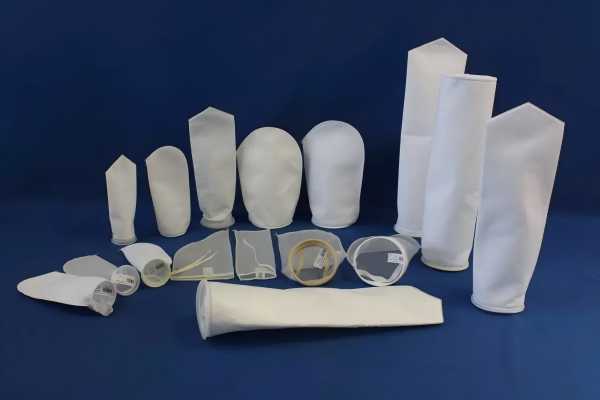Liquid filter bags are essential components in industrial filtration systems, providing efficient and reliable solutions for removing contaminants from liquids. They are widely utilized in many different industries to meet regulatory requirements, safeguard equipment, and guarantee product quality. This article delves into the types of liquid filter bags, their applications, and the benefits they offer.
Table of Contents
ToggleWhat Are Liquid Filter Bags?
Liquid filter bags are porous materials designed to trap solid particles while allowing liquids to flow through.To satisfy different filtration requirements, they are available in a range of sizes, compositions, and combinations. Typically installed in bag filter housings, these bags are a cost-effective and efficient way to handle filtration tasks in industrial settings.

Types of Liquid Filter Bags
Standard Felt Filter Bags
- Material: Polyester, polypropylene, or nylon felt.
- Features: High dirt-holding capacity, available in various micron ratings.
- Applications: utilized in sectors like paints, chemicals, and food and beverage manufacturing.
Mesh Filter Bags
- Material: Woven nylon or polyester mesh.
- Features: Precision filtration for smaller particle sizes.
- Applications: Ideal for applications requiring low-pressure drop and consistent filtration.
High-Efficiency Filter Bags
- Material: Multi-layered construction with melt-blown materials.
- Features: Superior filtration efficiency, extended service life.
- Applications: Used in pharmaceutical, electronics, and fine chemicals industries.
Oil Absorption Filter Bags
- Material: Polypropylene with oil-absorbing properties.
- Features: Specially designed for oil removal from water or other liquids.
- Applications: Commonly used in wastewater treatment and industrial cleaning processes.
Specialty Filter Bags
- Material: Customized materials for specific requirements.
- Features: Designed for high-temperature or chemical-resistant applications.
- Applications: Utilized in industries like petrochemicals and power generation.
Applications of Liquid Filter Bags
Food and Beverage Industry
- Filtration of syrups, juices, and dairy products to ensure product purity.
- Removal of impurities in brewing processes.
Pharmaceutical Industry
- Ensuring contamination-free production of medicines and active ingredients.
- Filtration of liquid suspensions and emulsions.
Chemical Processing
- Separation of solid particles from chemicals during manufacturing.
- Ensuring consistency and quality in chemical formulations.
Water and Wastewater Treatment
- Removal of sediments, oils, and debris from water.
- Pretreatment of water for industrial or municipal use.
Automotive Industry
- Coolant, lubricant, and paint filtration to preserve machinery and guarantee product quality.
Electronics Manufacturing
- High-precision filtration of process liquids to prevent contamination.
- Removal of fine particles from plating solutions.
Benefits of Liquid Filter Bags
- Efficient Contaminant Removal Liquid filter bags effectively trap contaminants, ensuring clean and consistent filtration results.
- Cost-Effective Solution With their high dirt-holding capacity and reusable options, filter bags reduce overall filtration costs.
- Wide Material Compatibility They come in a range of materials and are capable of handling a wide range of liquids, including high-temperature and corrosive ones.
- Easy Installation and Maintenance The simple design of liquid filter bags makes them easy to install, replace, and maintain, minimizing downtime.
- Customizable Options Filter bags can be made to fit certain filtration specifications, such as material, size, and micron ratings.
Comparing Types of Liquid Filter Bags
Below is a chart summarizing the key features and applications of various liquid filter bag types:
| Type | Material | Key Features | Applications |
| Standard Felt Filter Bags | Polyester, Polypropylene, Nylon | High dirt-holding capacity | Food, Chemicals, Paints |
| Mesh Filter Bags | Woven Nylon, Polyester | Precision filtration, Low-pressure drop | Low-Viscosity Liquids, Industrial |
| High-Efficiency Bags | Multi-Layered Materials | Superior efficiency, Extended service life | Pharmaceuticals, Fine Chemicals |
| Oil Absorption Bags | Polypropylene | Oil removal, High-absorption rate | Wastewater, Cleaning |
| Specialty Bags | Customized | High temperature/chemical resistance | Petrochemicals, Power Generation |
Factors to Consider When Selecting Liquid Filter Bags
- Micron Rating To capture the required particle size, use a bag with the proper micron rating.
- Material Compatibility Ensure the bag material can withstand the chemical composition and temperature of the liquid.
- Flow Rate Requirements Consider the required flow rate and pressure drop to select the right bag size and type.
- Application Specifics Evaluate the specific filtration needs of your application, including dirt load and filtration precision.
Maintenance and Longevity Tips
- Regular Inspections: Inspect bags for wear and tear to prevent failures during operation.
- Proper Cleaning: To keep reusable bags effective, wash them according to the manufacturer’s instructions.
- Timely Replacement: When bags exhibit blockage or decreased filtration effectiveness, replace them.
In order to guarantee hygienic and effective industrial operations, liquid filter bags are essential. Their versatility, cost-effectiveness, and adaptability to diverse applications make them an indispensable component in many industries. By understanding the types, applications, and benefits of liquid filter bags, businesses can optimize their filtration processes, reduce costs, and maintain high-quality standards.
